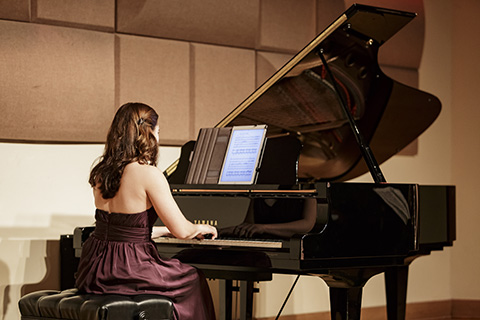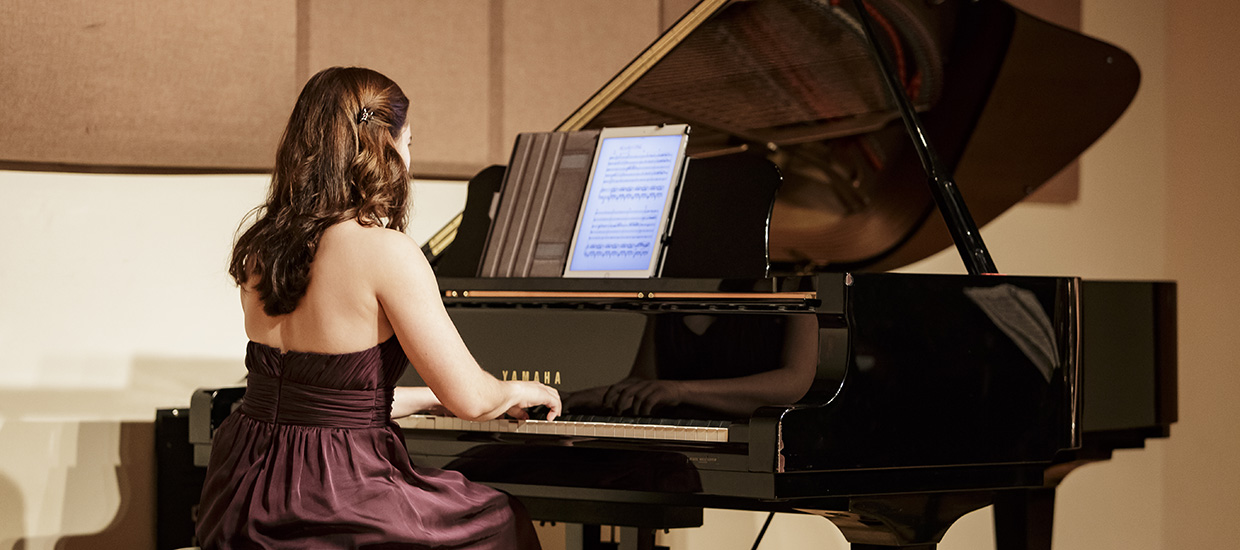A bachelor of music is an undergraduate degree focused on competency in vocals, conducting, or an instrument. This degree allows you to take classes in a variety of focus areas in order to become a well-rounded musician, communicator, and collaborator. With classes in music history, music theory, performance, and more, a bachelor of music prepares you with the skills to pursue the career path of your choice. Bachelor of music students graduate ready to perform in front of audiences, work with other musician and academic collaborators, and have a strong hold of music fundamentals. Bachelor of music students pursue a variety of careers, including music performance, becoming an educator, music business, music production, and many more. Bachelor of music students typically take four years to complete their degree.
How Can I Use a Bachelor of Music in My Career?
Pursuing a bachelor of music puts you on the fast track to success. Bachelor of music students work closely with world-renowned faculty in small groups to learn music history, music theory, and other fundamentals of communication, problem-solving, and performing in front of a range of audiences. Music students learn to be premiere communicators and expert collaborators, giving them an advantage in a competitive field. The Frost School of Music uses The Frost Method™—a unique pedagogical strategy in which students learn from each other in a collaborative setting. The Frost Method™ is a one-of-a-kind approach that positions students for success and allows individuals to play to their strengths in a program that values interdisciplinarity and co-learning.
What Kinds of Jobs Do Bachelors of Music Graduates Have?
Our bachelors of music graduates have gone on to enjoy a range of careers, from performance to music therapy to education and beyond. The Frost School requires all bachelor of music students to take a minor outside of the music program, which provides Frost graduates a unique advantage because of their interdisciplinary, liberal arts background. Frost is the school where a flute student with a musicology interest can also achieve a psychology minor. Frost is the school where a pianist who loves English can enjoy learning the fundamentals of both fields. Employers today are looking for applicants with a broad range of transferable skills and competencies. No matter which job path you pursue, a wide base of skills will give you a special advantage in the field.
What Do I Need to Know Before I Apply for a Bachelor of Music?
Music schools are looking for applicants who are academically strong and have musical talent they are looking to improve. Faculty are seeking students who are eager to learn new skills and competencies. After submitting the application, the next steps are completing the necessary portofolio and/or audition requirements. It’s important that you plan ahead so that you have plenty of time to choose the program of your choice, and put together each component of your application.
What Concentrations are Available in a Bachelor of Music?
A variety of concentrations are available for bachelor of music students, including the following:
- Instrumental Performance
- Keyboard Performance
- Vocal Performance
- Studio Jazz Instrumental
- Studio Jazz Vocal
- Music Education
- Music Therapy
- Theory and Composition
- Media Writing and Production
- Music Business and Entertainment Industries
- Musicianship, Artistry Development, and Entrepreneurship
- B.M. in Professional Studies
You may also be interested in a bachelor of science music engineering degree, a bachelor of arts in music, or the variety of minors and certificates also available. Over the course of your degree, your interests may evolve and grow. This is why the Frost School has a flexible, dynamic program.
What Will Happen During My Degree?
During your music degree, you’ll pursue advanced study in your focus area. This will happen in a few different ways: through private lessons, small ensembles, and group work in the classroom. Each music student’s journey is different, but all students benefit from the collaborative opportunities the degree offers. Faculty get to know you as a student and as a performer and will connect you with opportunities that play to your strengths and offer you growth. The Frost School offers the unique Frost Method™, an individualized approach that connects you with peers and faculty through small groups. The cognitive data is clear: small group collaboration is a highly effective way to learn, especially as a musician. The Frost Method™ helps you excel as a musician and a professional.
How Do I Find a Bachelor of Music Program That’s Right for Me?
When choosing a music program, it’s important to make sure that the program includes your intended area of focus. Not only should the program include study in your intended area, it should also have the opportunity to learn in any other interested focus areas like music therapy, education, musicology, et cetera.. Picking an interdisciplinary, liberal arts program is important. Interdisciplinary study allows you to avoid silos and focus on more than one area, an essential skill no matter what career path you choose. Selecting the right bachelor of music program involves making the sure school has the right courses of study, quality faculty, small class sizes, and that the school is situated in a desirable location. Visiting the school can help you get an idea of the atmosphere as well.





